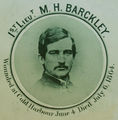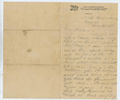Barckley Articles- Altamont Enterprise - July 21, 2011
Altamont Enterprise July 21, 2011
150 years later
Historical Society remembers a Civil War hero from Knox
By John Elberfeld
KNOX — To observe the beginning of the Civil War, the Knox Historical Society will commemorate local hero <a href="indexd365.html?title=Michael_Henry_Barckley" title="Michael Henry Barckley" class="mw-redirect">Lt. Michael Henry Barckley</a> in a new display opening July 31, with a reception from 2 to 4 p.m., at the Saddlemire Homestead on Route 156 in Knox.
In early June of 1864, Henry and "Mag" Barckley of Knox received the telegram from the Union Army that they had dreaded for almost two years. Their 23-year-old son, Mike, had been severely wounded in the leg during the battle of Cold Harbor in Virginia. They surely felt a combination of relief and anxiety when they received this Letter from their son dated June 8, 1864, four days after he was injured:
Dear Father —
As you have undoubtedly heard long before you will receive this that I am wounded and as the reports may not be favorable I thought I would let you know what the circumstances of the case were - Our Battalion of the 7th had just moved which being perceived by the Rebels they opened once with shell. They did not injure many. I am quite badly wounded so much so that my leg has been amputated above the knee.
Am now as comfortable as can be expected. Expect to move from here every hour so do not come after me till you hear from me again. Will let you know where my next resting place is as soon as I get to it.
Do not be alarmed for I am getting along first rate.
Your Son
MHB
Who was this young man who could endure the horror of war and the agony of an amputation but could still get along "first rate"?
Pre-war years
Michael Henry Barckley was born in Knox, N.Y. in 1840, the son of Henry and Magdalene Livingston Barckley. Henry Barckley was descended from German immigrants who came to the Guilderland area in the late 1700s. Henry did very well as both a shopkeeper and farmer in Knox, and was active in local politics. Magdelene's family members were also long-time residents of the area and her father, Aaron, was a War of 1812 veteran.
Michael attended public schools in Knox and in 1861 he entered Union College as a junior. While in college, he carried on continuous correspondence with his friend from Knox, George H. Quay. George would usually state, "I earnestly and sincerely hope these few broken and ungrammatical lines will find you just as you are." George would then tell about his search for a teaching position in nearby towns, or the goings-on in Pucker Street, a name for Knox "pinned onto the village by young men of the day because so many old maids lived there — presumably of sour miens and dispositions." George later became a Leader in education in the Albany area.
Enlisting and writing home
After graduating from Union College in 1862, Michael enlisted in the Union Army. He convinced 21 of his friends to also enlist in Company K of the 113th New York Volunteer Infantry. The company selected Michael as its first lieutenant, and, to celebrate his success, Knox town residents raised the money, purchased, and presented him with a ceremonial sword and sash.
After listening to a long oration, Michael accepted the sword and stated, "I accept these testimonials of regard from the patriotic citizens of my native town, who have confided them in trust to me, and here promise to hold them sacred." Michael was a local hero who Led a good number of Knox's young men into war.
During the first year that Michal was in the army, his regiment was converted to the 7th New York Heavy Artillery under Colonel Morris, and the regiment was assigned to Camp Reno just outside of Washington, D.C., to man the big guns around the city to protect the capital from an attack that never came.
His Letters home showed how human he was. When he realized his mother was opening and reading his personal mail before she forwarded it to him, he replied, "I would have been much more pleased if it had not been opened."
Michael's Letters to his father often contained references to money. "In regard to any saving money I will save all I possibly can. Last week I had to pay $15.00 for a pair of pants. I buy nothing but what I actually need."
He also talked about those who died of camp sickness, and about his efforts to obtain furloughs for friends in his company so they could go home and visit their families in Knox.
Into the fight
After a year of uneventful drilling and preparation, Michael's regiment was sent to war and joined the army of the Potomac on May 15, 1864. In one short month. Michael fought along the Rapidan. at Spottsylvania Court House, Fredericksburg Road. North Anna River. Pamunkey, Totopotomoy, and finally Cold Harbor on June 1. Michael survived the slaughter at Cold Harbor. and was in the trenches close to enemy lines the day after the main battle ended when a rebel shell shattered his Leg June 4, 1864.
He was taken first to the Washington Landing Hospital where he wrote his parents on June 8, saying he was "doing first rate" in spite of the amputation of his Leg above the knee. On June 11, he was transferred to Carver Hospital.
His mother, Magdalene. his Aunt Jane Ann Johnson, and Uncle George Young Johnson traveled to Carver Hospital in Washington, D.C. — his father remaining in Knox to tend the farm and store. George Johnson wrote to Michael's father, "All is as well as can be expected — Michael does not look badly for one who has endured so much — he is sociable and cheerful. He said he feared the telegram would startle us."
In spite of losing a Leg, Michael was concerned about the effect of the Army's telegram on his family.
His mother wrote to her husband in Knox, "Mike is adoing well as can be. Mike has first rate living here. Chicken every day and everything that good and nourishing."
She asked her husband to send another pair of cotton gloves, as she had lost hers on the way through New Jersey and local stores charged too much. She also reported on the many young men from Knox who were dead, wounded, captured, and missing.
In spite of the optimism expressed in letters home, Michael never came back to Knox. He died on July 6, 1864, from exhaustion caused by the amputation. His mother brought his body back to Knox, where Michael became the first person to be buried in the new Knox cemetery.
Michael's legacy
Of the 21 young men from Knox who joined Michael in Company K, 16 died during the war. Michael never married, and his only brother, Edward, had one daughter, Grace, who died unmarried in 1919, so there are no descendents or close relatives to carry on his memory.
Michael was honored by having the Grand Army of the Republic Post 198 of Knowersville (a social and support fraternity of Union soldiers, based locally in what is now called in Altamont) named for him, but the post was discontinued when it last member died in 1928.
To keep his memory alive, and to share his letters and documents, the Knox Historical Society has developed a comprehensive display of "Knox in the Civil War" at the Saddlemire Homestead in Knox.
In addition to Barckley's papers, copies of original, handwritten enlistment rolls and muster rolls of many soldiers from Knox will be available. The homestead (at 2190 Berne-Altamont Road, Route 156, by the firehouse) will have numerous histories and documents available for research. Please join us, and Learn how to do the research needed to document the history of your relatives and other local heroes of the Civil War.
Sources
Much of this information in this story came from family Letters at the Knox Historical Society that will be on display on July 31. Resources on www.AlbanyHilltowns.com and articles from the Altamont Enterprise archives provided additional details.
Editor's note: John Elberfeld is a member of the Knox Historical Society and is its treasurer
Knox - Lt. Michael Henry Barckley - Altamont Enterprise Article - Page 1 - July 21, 2011 Knox - Lt. Michael Henry Barckley - Altamont Enterprise Article - Page 2 - July 21, 2011 - The Enterprise — John Elberfeld - Native son: Michael Henry Barckley, who was born in Knox in 1840 and graduated from Union College in Schenectady in 1862, led a company filled with his Knox friends into battle for the Civil War. Sixteen of the 21 young men died during the war. Barckley died at age 23 after having his leg amputated; a rebel shell had shattered his leg the day after the slaughter at Cold Harbour. The Enterprise — John Elberfeld - Heartfelt letter home: Lt. M. H. Barckley wrote from the hospital after having his leg amputated to reassure his parents. The stationery was provided by The U.S. Christian Commission. The letter is now part of an exhibit put together by the Knox Historical Society at the Saddlemire Homestead on Route 156 in Knox. The Enterprise — John Elberfeld - Heartfelt letter home Page 2: Lt. M. H. Barckley wrote from the hospital after having his leg amputated to reassure his parents. The stationery was provided by The U.S. Christian Commission. The letter is now part of an exhibit put together by the Knox Historical Society at the Saddlemire Homestead on Route 156 in Knox The Enterprise — John Elberfeld - Ceremonial sword: Knox residents raised funds to buy this sword for Michael Henry Barckley after he was selected as first lieutenant of Company K of the 113th New York Volunteer Infantry. Upon receiving the sword, Barckley said, "1 accept these testimonials of regard from the patriotic citizens of my native town, who have confided them in trust to me, and here promise to hold them sacred."





